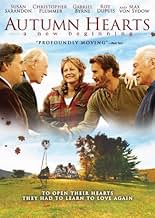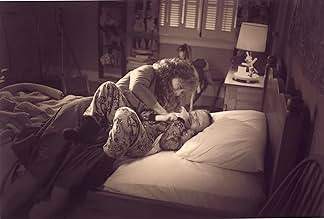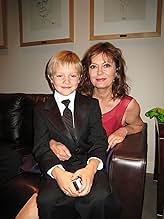AUTUMN HEARTS: A NEW BEGINNING is another one of those independent films that lacks an audience until the DVD is released. Granted it is not based on subject matter that titillates the big movie house throngs, but it is a warmly tender film about the emotional effects of historical traumas and how each of our histories molds our lives. It is a superb work on every level. Director Paolo Barzman brings to life the novel 'Emotional Arithmetic' by Matt Cohen (as adapted for the screen by Jefferson Lewis) with a sterling cast of consummate actors. The impact is lasting.
Melanie Winters (Susan Sarandon) lives on a picturesque farm in Canada with her retired university professor husband David (Christopher Plummer) and their grown son Benjamin (Roy Dupuis), an unexplained single father of his own son Timmy (Dakota Goyo) and caregiver for his physically ailing father and mentally fragile mother. Melanie lives in the past: as a child in 1942 she was interned in Drancy, an internment camp outside of Paris where she bonded with a young man Jakob Bronski and an Irish lad Christopher - taking on the responsibility of maintaining the written history of the camp at Jakob's request so that atrocities such as they were witnessing would never occur again ('Always remember'). At one point Jakob turned himself over to the Nazis to allow Melanie and Christopher to be released.
Now, years later, Melanie is still cataloging all of the atrocities in the world as they appear in the newspaper and continues to attempt to find Jakob. Jakob writes to her and soon is arriving in Canada as an elderly man (Max von Sydow), traveling with his surprise guest, the adult Christopher (Gabriel Byrne). It is this visit that reunites Melanie, Jakob, and Christopher that allows closure to their turbulent history and a healing not only for the three survivors but for Melanie's family also. It is as though it took a quiet time in the beauty of nature and the life-sustaining atmosphere of a farm to cleanse these 'autumn hearts' from the anguish of the past.
Not all of the elements of the story are resolved: we never learn much about Benjamin and his state of solo fatherhood, David's private life that so incenses Melanie, etc. But these are minor exclusions in this beautifully sculpted story and film. The cinematography by Luc Montpellier and the musical score by Normand Corbeil capture not only the beauty of the Canadian landscape and lush colors of the farm in autumn, but also heighten the authenticity of the Drancy camp experience in the black and white flashbacks. This is an exceptional film that deserves a wide audience. Grady Harp






























